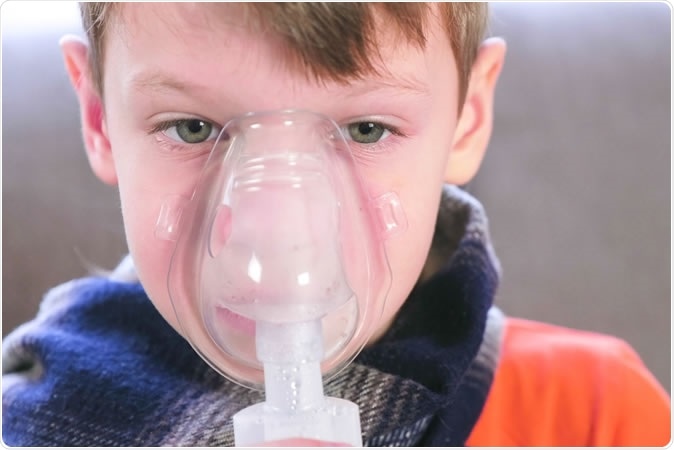A new study raises the possibility of modulating asthma symptoms via the bacteria that commonly live in the upper airway. The work, which was published on December 16, 2019, in the journal Nature Communications, shows that in children who have mild to moderate asthma, the microbiome of the upper airway could determine how severe the symptoms are.

A child with asthma uses an inhaler. A new study from Washington University School of Medicine in St. Louis showed a correlation between the types of bacteria in the upper airway and severity of asthma symptoms. The study will lead to future research seeking possible ways to alter the airway microbiome to reduce asthma severity. Image Credit: Vadim Zakharishchev / Shutterstock
Asthma
The condition called asthma is a fairly common illness among children, affecting over 6 million children in the US. This accounts for about a twelfth of the pediatric population, making it the most common chronic condition in this age group. It is the leading cause for missing school, according to the statistics compiled by the Asthma and Allergy Foundation of America.
In asthma, the airways become over-inflamed when exposed to otherwise innocuous stimuli, in a hypersensitivity reaction. As a result, they swell up, narrow and produce more mucus than normal. the resulting blockage can be severe enough to obstruct breathing altogether. However, asthma occurs over a spectrum of severity, from minor wheezing symptoms to life-threatening breathlessness.
Bacteria in the upper airway
There is a diverse community of bacteria in the upper airway of humans, including both commensal bacteria that live in harmony with the host and prevent colonization by and infection by disease-causing bacteria, and others which can turn dangerous if the host weakens. The latter group includes Streptococcus pneumoniae, Staphylococcus aureus, Hemophilus influenzae, and Moraxella catarrhalis.
In the current study of the upper airway microbiome, which was conducted using data retrieved from a clinical trial called the Step Up Yellow Zone Inhaled Corticosteroids to Prevent Exacerbations (STICS), the researchers looked at the bacterial populations in the upper airway – the mouth, nose, throat and trachea – in 214 children who have asthma of mild to moderate severity, aged 5-11 years. They found that the presence of bacteria like Staphylococcus, Streptococcus and Moraxella in the upper airwaywas a risk factor for asthma exacerbations. In fact, when these children showed signs that their asthma was about to flare up, their upper airway microbiome was more likely to include these bacterial groups. On the other hand, if other microbes like Corynebacterium or Dolosigranum were present, the asthma was likely to be under good control and the children were in fine health.
A second observation made during the current research was that there was a particularly high-risk group of children in whom the airway microbes were originally composed of the latter but switched to Moraxella. Other types of switching microbial communities were not found to have this risk.
Researcher Yanjiao Zhou says they observed “a rapid change of the airway microbiome in the children who transitioned from respiratory health to disease. "It is also intriguing to find that the microbiome changing pattern could play an important role in asthma exacerbation,” he remarked.
The study background
The STICS trial was part of a national level asthma research network called AsthmaNet, which receives federal funding. It was motivated by the need to understand whether using inhaled steroids at four times the usual initial dosage when facing a child with early signs of an asthma flare-up could hold matters in check better and enhance resolution better than maintaining the child on low-dose steroids. The outcome showed no evidence of benefit with higher steroid doses, and this result has been published earlier in 2018 in The New England Journal of Medicine.
While administering inhaled steroids, the researchers in the STICS trial also took samples of nasal mucus and cultured them to find out what kind of bacteria were living in the upper airways of children with mild to moderate asthma. The samples were taken both at the beginning, when all participants were in a state of control, and then at times when the children showed the earliest warning signs of an exacerbation.
Implications and future directions
The researchers plan to follow up these studies in mice, using bacterial inoculations to set up carefully regulated airway microbiomes to discover if they play a role in causing more severe asthma symptoms. If so, it is possible that the microbiomes can be manipulated to see how they can be altered on purpose, in order to protect the children against such flare-ups.
Senior author Avraham Beigelman says, “There is an urgent need to develop better asthma therapies for these patients. Though our study can't prove causation, it raises intriguing questions that we plan to pursue. If we somehow supplement such patients with what appear to be good bacteria, will they do better? We are interested in studying whether we can deliberately alter the airway microbiome to reduce the risk of worsening asthma symptoms."
Journal reference:
Zhou Y, Jackson D, Bacharier LB, Mauger D, Boushey H, Castro M, Durack J, Huang Y, Lemanske RF, Storch GA, Weinstock GM, Wylie K, Covar R, Fitzpatrick AM, Phipatanakul W, Robison RG, Beigelman A. The upper-airway microbiota and loss of asthma control among asthmatic children. Nature Communications. Dec. 16, 2019, https://www.nature.com/articles/s41467-019-13698-x